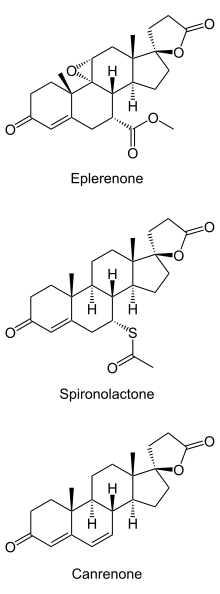Antimineralocorticoid
An anti-mineralocorticoid, or an aldosterone antagonist, refers to a diuretic drug which antagonizes the action of aldosterone at mineralocorticoid receptors. This group of drugs is often used as adjunctive therapy, in combination with other drugs, for the management of chronic heart failure. Spironolactone, the first member of the class, is also used in the management of hyperaldosteronism (including Conn's syndrome) and female hirsutism.
Mechanism of Action
Aldosterone antagonists are, as the name suggests, receptor antagonists at the mineralocorticoid receptor. Antagonism of these receptors inhibits sodium resorption in the collecting duct of the nephron in the kidneys. This interferes with sodium/potassium exchange, reducing urinary potassium excretion and weakly increasing water excretion (diuresis). [1]
In congestive heart failure, they are used in addition to other drugs for additive diuretic effect, which reduces edema and the cardiac workload.
Examples
Members of this class in clinical use include:
See also
References
External links
|
|---|
| | Agonists | |
|---|
| | Antagonists | |
|---|
| | Synthesis modifiers | |
|---|
| |
| | |
|---|
| | Description |
- Glands
- Hormones
- thyroid
- mineralocorticoids
- Physiology
- Development
|
|---|
| | Disease |
- Diabetes
- Congenital
- Neoplasms and cancer
- Other
- Symptoms and signs
|
|---|
| | Treatment |
- Procedures
- Drugs
- calcium balance
- corticosteroids
- oral hypoglycemics
- pituitary and hypothalamic
- thyroid
|
|---|
|
|
|
|---|
| Sulfonamides
(and etacrynic acid) | |
|---|
| | Potassium-sparing (at CD) | |
|---|
| | Osmotic diuretics (PT, DL) | |
|---|
| Vasopressin receptor antagonists
(DCT and CD) | |
|---|
| | Other | |
|---|
| |
|---|
| | Description |
- Anatomy
- Arteries
- head and neck
- arms
- chest
- abdomen
- legs
- Veins
- head and neck
- arms
- chest
- abdomen and pelvis
- legs
- Development
- Cells
- Physiology
|
|---|
| | Disease |
- Congenital
- Neoplasms and cancer
- Lymphatic vessels
- Injury
- Vasculitis
- Other
- Symptoms and signs
|
|---|
| | Treatment |
- Procedures
- Drugs
- beta blockers
- channel blockers
- diuretics
- nonsympatholytic vasodilatory antihypertensives
- peripheral vasodilators
- renin–angiotensin system
- sympatholytic antihypertensives
- vasoprotectives
|
|---|
|
|
|
|---|
| | Receptor | |
|---|
| | Enzyme | |
|---|
| | Others | |
|---|
| See also: Androgenics • Estrogenics • Glucocorticoidics • Progestogenics |
|
